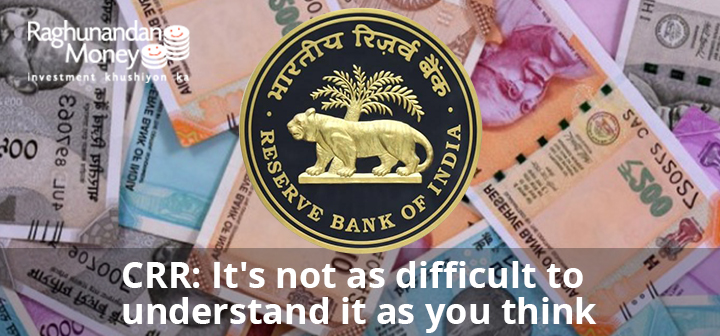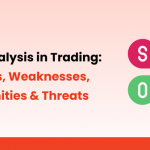What is Cash Reserve Ratio (CRR):
Cash Reserve Ratio (CRR) is the ratio of the total cash that banks required to keep as a reserve with Reserve Bank of India (RBI) in the form of liquid cash. Maintenance of Cash Reserve Ratio (CRR) is defined in section 42(1) of the Reserve Bank of India (RBI) Act, 1934. CRR is used to control the money flow in the market. Suppose there is more money supply in the market than Reserve Bank of India (RBI) increases the CRR which will cut short the money supply in the market. And if there is less money in the market then the RBI may reduce the CRR to push money into the market. The current CRR is at 4% in India. The maintenance of CRR has to be on a daily basis.
Objectives of Cash Reserve Ratio:
Reserve Bank of India keeps some part of deposits from banks with itself in the form of Cash Reserve Ratio which enhances security. CRR is used as a tool to control the inflation in the economy. The Cash Reserve Ratio works as reference rates to determine the base rate. There is a minimum lending rate below which banks are not allowed to lend money that is called base rate. Reserve Bank of India (RBI) determines the base rate. The base rate is fixed which ensures transparency and this rate is also helpful in cutting down on the cost of lending for providing affordable loans.
Effect of CRR on Market:
Cash Reserve Ratio is the main component to control the money supply, level of inflation, and liquidity in the market. High Cash Reserve Ratio reflects in low money supply in the market and low CRR reflects more money supply in the market. The impact of CRR is explained below in details-
- Impact of decrease in CRR: A reduction in CRR results in more money with the banks which can be used in other business activities as banks need to keep less money with RBI. The more money available with banks increases loan distribution of banks and the more money also results in a decrease in interest rates loans provided by the banks.
If we look at the inflation perspective, the more money with the banks due to lower Cash Reserve Ratio results in more money supply in the economy. More money supply in the economy results in an increase in inflation in the economy.
The stock market will also be impacted by a reduction in the cash Reserve Ratio in a positive way. The more money supply in the market and with banks will result in easy availability of money for investors and traders. The more money with investors and traders will result in more liquidity in the stock market.
The increment in loan rates will result in less money supply in the market. Consumers will borrow less on higher interest rates and conclusively spend less. The lower expenditures by consumers will result in lower demand in the market. Lower demand in the market will curb inflation in the economy.
The stock market will take this action in a negative way as less money with the banks leads to less money for investors. The less money with investors and traders will result in less liquidity in the stock market.
Conclusion:
Cash Reserve Ratio (CRR) is one of the very important tools for controlling money flow in the economy. It also enhances the security among depositors that some part of their saving is kept safe with the RBI. CRR is widely used by central banks all around the world. As Cash Reserve Ratio is maintained only in cash form this makes it different from other money flow controlling tools like Statutory Liquidity Ratio (SLR). As some portion of the money of depositors is always kept with RBI, this gives safety to depositors. In case of immediate need of cash to banks, Cash Reserve Ratio plays a very important role in the functioning of the banking system.
About Author

Stock Trading Now trade in ₹9 Per Order or ₹ 999 Per Month Plans.
Future & Options Access F&O contracts with advanced tools for hedging and speculation.
Currency Trading Trade in major currency pairs and manage forex exposure efficiently.
Commodity Trading Diversify Trading with MCX & NCDEX by Trading in Gold, Silver, Base Metals, Energy, and Agri Products.
Margin Trading Funding Boost your buying power with upto 5X, Buy now Pay Later
Algo Trading Back test, Paper Trade your logic & Automate your strategies with low-latency APIs.
Trading View Leverage Trading View charts and indicators integrated into your trading platform.
Advanced Options Trading Execute multi-leg option strategies with precision and insights.
Stock Lending & Borrowing Earn passive income by lending stocks securely through SLB.
Foreign Portfolio Investment Enable NRIs and FPIs to invest in Indian markets with ease and compliance.
IPO Invest in upcoming IPOs online with real-time tracking and instant allotment updates.
Direct Mutul Funds 0% Commissions by investing in more than +3500 Direct Mutual Fund Scheme.
Corporate FDRs Earn fixed returns with low-risk investments in high-rated corporate fixed deposits.
Stocks SIPs Build long-term wealth with systematic investment plans in top-performing stocks.
Bonds & NCDs Access secure, fixed-income investments through government and corporate bond offerings.
Depository Services Safely hold and manage your securities with seamless Demat and DP services with CDSL.
Insurance One-Stop Destination For All Your Insurance Needs. Compare Quotes from Top Insurers & save bigs.
Journey Tracing our growth and milestones over time.
Mission & Vision Guided by purpose, driven by long-term vision.
Why RMoney Platform Smart, reliable platform for all investors' needs.
Management Experienced leadership driving strategic financial excellence.
Credentials Certified expertise with trusted industry recognition.
Press Release Latest company news, updates, and announcements.
Testimonials Real client stories sharing their success journeys.
7 Reasons to Invest Top benefits that make investing with us smart.
SEBI Registered Research Trusted insights backed by SEBI-compliant research.
Our Technology Advanced tools enabling efficient online trading.
Calculators Access a suite of smart tools to plan trades, margins, and returns effectively.
Margin Calculator Instantly check margin requirements for intraday and delivery trades.
MTF Calculator Calculate MTF funding cost upfront to ensure full transparency before placing a trade.
Brokerage Calculator Know your exact brokerage charges before placing any trade.
Market Place Explore curated investment products and trading tools in one convenient hub.
RMoney Gyan Enhance your market knowledge with expert blogs, videos, and tutorials.
Performance Tracker Track our research performance with full transparency using our performance tracker.
Feedback Share your suggestions or concerns to help us improve your experience.
Downloads Access important forms, software, and documents in one place.
Locate Us Find the nearest RMoney branch or service center quickly.
Escalation Matrix Resolve issues faster with our structured support escalation process.
Back Office Log in to view trade reports, ledger, and portfolio statements anytime.
Account Modification Update personal or bank details linked to your trading account.
Fund Transfer Transfer funds instantly online with quick limit updation to your trading account.
Bank Details View our registered bank account details for seamless transactions by NEFT, RTGS or IMPS.
How to Apply IPO Step-by-step guide to apply for IPOs using your trading account.
RMoney Quick Mobile App Trade on-the-go with our all-in-one mobile trading app.
RMoney Quick login Quickly access your trading account through the RMoney Quick web-based trading.
RMoney Rocket Web Version Experience powerful web-based trading with advanced tools for algo traders.
RMoney Rocket Mobile Version Trade anytime, anywhere with our feature-rich mobile trading platform.




















